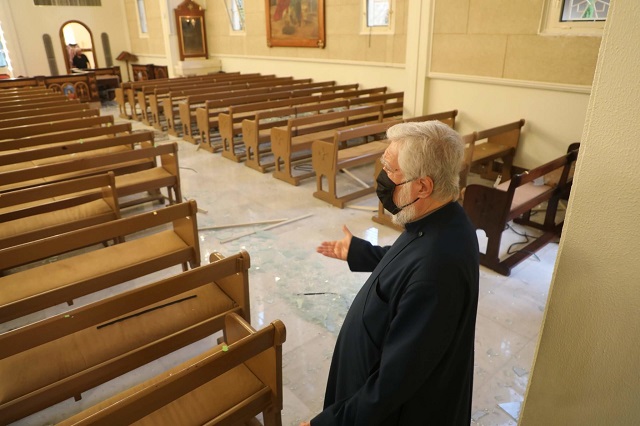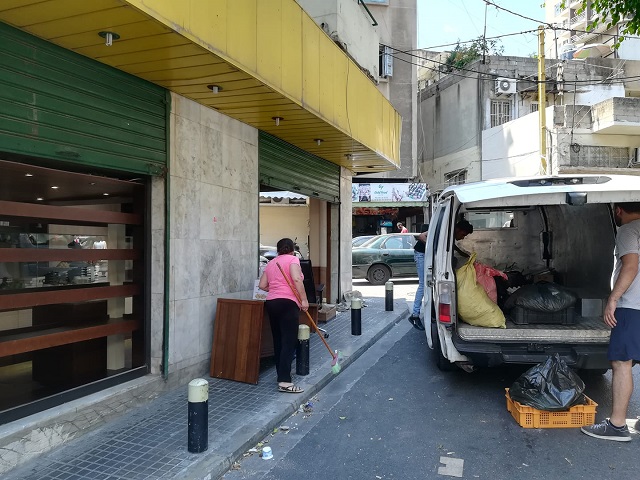The Armenian Weekly. The Armenian government is mobilizing to provide emergency humanitarian assistance to Lebanon less than a day after a massive explosion devastated large parts of central Beirut. Armenian Prime Minister Nikol Pashinyan held a telephone conversation with Lebanese President Michel Aoun on Wednesday morning to offer condolences to the families of the victims and discuss the scope of the assistance.
For his part, President Armen Sarkissian has also been in contact with the Catholicos of the Great House of Cilicia Aram I who is based in Antelias—a northern borough of Beirut—in order to assess the situation and determine how to provide tailored assistance to the country’s substantial and influential Armenian community. Artsakh’s President Arayik Harutyunyan also spoke with Aram I and said Artsakh is ready to receive 150 Lebanese-Armenian families.
The explosion was reportedly caused by a large stockpile of 2,700 tons of ammonium nitrate catching fire in a warehouse in the port of Beirut. The historic Armenian neighborhood of Bourj Hammoud which lies less than three kilometers (1.8 miles) from the city’s major cargo terminal has been heavily damaged by the blast. According to reports, one of the main Armenian cathedrals has suffered major damage, and photos uploaded to social media sites depict devastation on some of the neighborhood’s main commercial thoroughfares.
Additionally, the heavily-Armenian populated areas of Achrafieh and Nor Hadjin were scenes of widespread destruction, while Mar Kikhail–which lies directly adjacent to the port itself–was reportedly “snuffed out” by the blast. “These four Armenian districts suffered heavy damage, with some buildings having all their windows shattered, and other buildings being completely destroyed,” said Yeghia Tashjian, a Beirut-based policy analyst and Armenian Weekly contributor. The number of Armenian dead has been estimated at 11, with at least 250 injuries according to Lebanese parliamentarian and Armenian Revolutionary Federation (ARF) Central Committee Lebanon member Hagop Pakradouni. Among the casualties is prominent Lebanese-Armenian politician Nazar Najarian who had recently returned to the city from Montreal to take up the post of secretary-general of Lebanon’s prominent Maronite-dominated Kataeb (Falange) Party.
Read also
High Commissioner for Diaspora Affairs Zareh Sinanyan announced in a statement that he had spent most of Tuesday night consulting with Armenian community leaders on the ground in Beirut to assess the situation and determine a course of action to assist the city’s sizable Armenian population. Sinanyan’s office says the community’s most urgent needs include medication for chronically ill patients, food and water and financial aid for rebuilding homes, shops, schools, churches and community centers. The statement also mentioned efforts to streamline the repatriation process to Armenia, as well as psychological support.
Just hours before the explosion, the Diaspora Ministry and the Repat Armenia Foundation welcomed a group of 90 repatriates from Lebanon to help them settle into a new life in Armenia. “No one would imagine that two hours later…” read a post on Repat Armenia’s Instagram page. The explosion is expected to accelerate the rate of repatriation with many in Armenia calling on the government to further facilitate the application process for ethnic-Armenians.
Armenian churches, community centers, schools and businesses dot the skyline of Beirut’s eastern neighborhoods—a lasting reminder of the city’s importance to Lebanon’s 150 thousand-strong Armenian community. Armenians of Beirut—most of whom are descendants of refugees from the 1915 Genocide—have made important contributions to Lebanon’s social, commercial and political life. Due to Lebanon’s sectarian constitution, Armenians hold some seven seats in the Lebanese Parliament, while many have held important cabinet positions. At least one Lebanese president, Emile Lahoud, is of Armenian descent.
While the Lebanese Civil War forced many to relocate to France, Canada and the United States, Beirut remains an important cultural hub for Armenian Diaspora life and a major publishing center for Western Armenian publications. Many Beirut-born Armenians have chosen to repatriate to Armenia, bringing with them unique tropes of Western Armenian culture, business acumen and Lebanese cuisine, which is now ubiquitous across the Armenian capital.
Lebanese Armenians have also played a very prominent role in the traditionally warm relations between their respective countries. Lebanon was among the first countries in the world—and the first Arab nation—to recognize the Armenian Genocide in 2000. Armenia, in turn, sent humanitarian aid to Beirut once before, during the 2006 invasion of the country by Israel. At the time, Armenia hosted almost one thousand mainly-ethnic Armenian refugees who were evacuated from the beleaguered city to escape daily aerial bombings. Since then, a 32-man strong Armenian peacekeeping detachment has been stationed in Lebanon as part of the UN-led mission. According to the Defense Ministry, however, none of them were injured by the blast, and they continue to fulfill their duty.
The latest shipment of humanitarian assistance will reportedly include medicine, medical equipment, food and other supplies. The explosion in Beirut comes in the wake of the worst economic crisis in Lebanon since the 1975-2000 Civil War which devastated much of the country. In addition, the Lebanese people have been dealing with a political crisis since the dissolution of the previous government in 2019 in the wake of mass demonstrations over entrenched corruption and gross mismanagement. To make matters worse, the country’s resources have already been stretched thin due to the influx of refugees from the raging civil war in neighboring Syria and the ongoing global COVID-19 pandemic. Just days before the explosion, the humanitarian organization Save the Children estimated that half a million children are hungry in Beirut alone. As much as 60-percent of Lebanon’s population might drop below the poverty line as this latest crisis adds to chronic stagflation. The explosion at the city’s main port will also likely disrupt the importation of vital food supplies to the country where basic staples are already increasingly scarce on shelves.
Armenia’s pledge for humanitarian assistance succeeds similar offers from France, the Gulf countries, Turkey, the European Union and the United States among others.























































